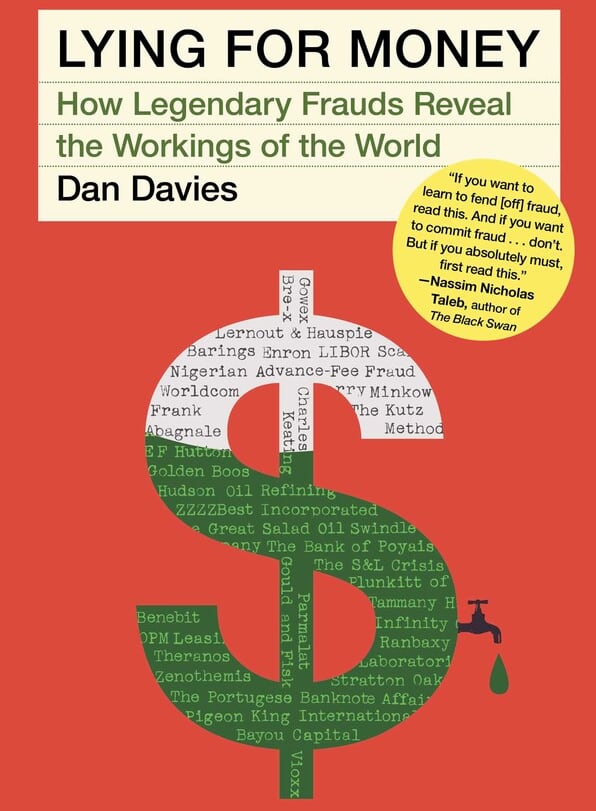
Lying For Money
How Legendary Frauds Reveal the Workings of the World
By Dan Davies
Published by Scribner
ISBN: 978-1-9821-1493-0
True crime is big at the moment. You can't swing a cat (itself a crime) without hitting at least a couple of crime podcasts and a Netflix exclusive documentary series, each more lurid and distasteful than the last. And I can get the appeal - larger than life characters operating outside of the social boundaries we set for ourselves.
Unfortunately I have less of a stomach for gristly real-life murders or tiger-endangerment than most of the general population but the call of true crime still beckons. Lying for Money is perfect for me - a compendium of non-violent, occasionally clever crimes both historical and very recent.
But Lying for Money aims to be more than that. It is a survey of the financial crime landscape - from basic one-person scams up to Enron-level corporate ratfuckary - with Davies explaining the circumstances that allowed or oft'times encouraged the fraud. A main thesis of the book is that trust is essential to business and where-ever there is trust there is some level of fraud.
As Davies puts it one of the best techniques a neurologist has for understanding the enormous complexity of the brain is to study brain diseases and injuries to see what broke and how it affected the whole structure. Likewise, studying events where the financial systems of the world have broken down allows a deeper understanding of how those systems are suppose to work.
Lying for Money introduced me to a very useful word - criminogenic. A criminogenic system is in a state where the rewards for crimeor unethical behavior - the line is blurred for a lot of financial crimes are maximized while the penalties are non-existent. Nobody sat down and decided to push mortgages onto people who obviously couldn't pay, while on-selling those mortgages to funds who misrepresented their safety using ratings from agencies who inflated their worth. There wasn't one person or even group who did all these things but perverse incentives were in place that all-but ensured that things would work out. The result is a huge financial mess with almost nobody to actually blame for it.
But most of the crimes in Lying for Money are the work of a single person or small group. Some are grand schemes, other are petty and sad. Almost all come to bad ends - Lying for Money makes it clear that a fraudster's lot is usually not a happy one. Unlike robbing a bank vault, it is almost impossible to commit a single big fraud. Most frauds eventually spiral out of control as the perpetrators scramble to find increasing sums of money to cover up their original crime.
I was expecting some information on the many, many, many cryptocurrency scams of the last few years. There is none but in other ways Lying for Money is pleasingly up-to-the-minute. There is even a small mention of how the global pandemic has ruined the time-honored money laundering tradition of funneling dirty money through a restaurant.
Of course, the real draw of true crime media is imagining how you would avoid making the same mistakes in cunningly getting away with it all. Lying for Money even makes this point but cruelly doesn't ofter any advice. I guess we all get to stay poor then. Unless you want to buy some of the sheep.horse bonds I have on offer - see the contact details on my homepage.